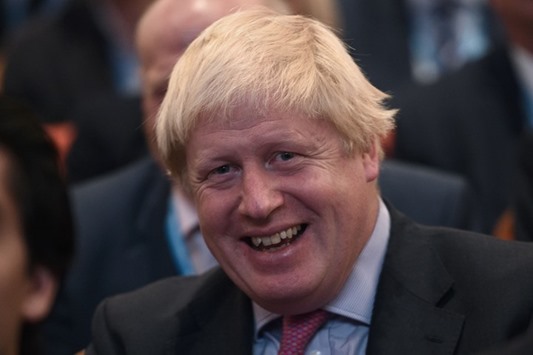After years as the court jester of British politics, Boris Johnson now has one of its top jobs as foreign minister. But while his star dimmed after the Brexit vote, insiders say his ambition to be prime minister has not.
His path to Downing Street may not be that straightforward, despite the standing ovation the man credited with taking Britain out of the EU got at the Conservative conference in Birmingham, central England, on Sunday.
Boris, as he is widely known, must now help to deliver Brexit and will eventually have to put his name to a deal which could prove deeply divisive among the party and voters.
“Johnson doubtless still wants to run the country in some distant day,” said Paul Goodman, editor of the influential ConservativeHome website and a former MP.
“He knows well that his best means of doing so now – and in future – is to get on with the day job.”
Popular with the public, the ex-mayor of London is seen by many voters as a breath of fresh air for capers like getting stuck on a zipwire at the 2012 London Olympics and flattening a Japanese schoolboy while playing rugby.
In a typically bravado performance on Sunday, he invoked JK Rowling and the Kardashians, Brexit and the Iraq war in arguing why Britain should stand up for liberal democracy and capitalism.
But his appointment in July was greeted with incredulity by many on the world stage.
A clip of US State Department spokesman Mark Toner struggling to keep a straight face at the news went viral online, while Sweden’s former foreign minister Carl Bildt said: “I wish it was a joke.”
Johnson had previously caused plenty of offence, with his remarks. This has come back to haunt him in his new job.
Johnson’s colourful style contrasts sharply with Prime Minister Theresa May’s no-nonsense approach and the two have clashed in the past.
“They can’t stand each other,” a source who worked closely with Johnson before the referendum said, speaking anonymously.
“He’s not strategic – he’s a journalist at heart, thinking about tomorrow’s headlines,” the source added, referring to Johnson’s former career.
But he is one of a trio of eurosceptics nicknamed “the three Brexiteers” May has appointed to deliver EU withdrawal, apparently on the basis of “you break it, you own it”.
The prime minister herself campaigned quietly for Britain to stay in during June’s vote.
Her decision to appoint him surprised many following a chaotic post-referendum period in which Johnson’s stock surged and plunged.
After playing a central role in securing the Brexit vote, he was hailed by eurosceptics but became a hated figure for many of the 48% of Britons who voted to remain.
Crowds even gathered outside his London home to jeer him.
Johnson was then favourite to replace outgoing premier David Cameron before abruptly announcing he would not stand after fellow Brexiteer Michael Gove said he “cannot provide the leadership” needed.
Many commentators thought that had ended his top-level political career before May handed him one of Britain’s great offices of state.
Despite his clownish persona, Johnson does have plenty of characteristics that qualify him to be top diplomat.
“People forget that he’s actually fearsomely intellectual. He’s well-travelled, well-versed, knowledgable,” said Victoria Honeyman, a politics lecturer at Leeds University.
But Honeyman warned it could be “impossible” to deliver a popular Brexit deal because Britons have such different views of what they want to happen – with consequences for his ambitions.
“He’s kind of at a crossroads,” she said. “If Brexit negotiations go well, then his political career will continue to rise and he might well be feted as another leader.
“If they don’t go well, it might be that his support ebbs away.”

Boris Johnson: Johnson’s colourful style contrasts sharply with Prime Minister Theresa May’s no-nonsense approach and the two have clashed in the past.
